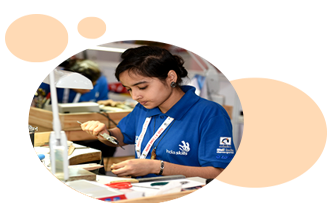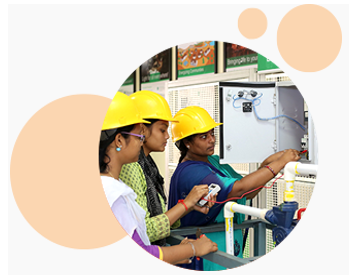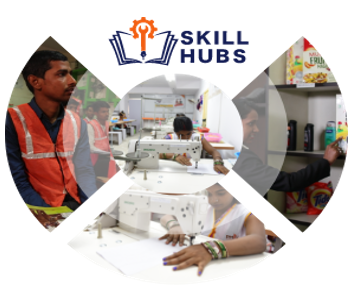Pradhan Mantri Kaushal Vikas Yojana (PMKVY) is the flagship scheme of the Ministry of Skill Development and Entrepreneurship (MSDE) implemented by National Skill Development Corporation (NSDC). The objective of this Skill Certification scheme is to enable Indian youth to take up industry relevant skill training that will help them in securing a better livelihood. Individuals with prior experience are also assessed and certified under Recognition of Prior Learning (RPL).
With an aim to empower country’s youth and continue the journey of Skill India Mission in building India as the skill capital of the world, the Ministry of Skill Development and Entrepreneurship (MSDE) launched its flagship scheme — Pradhan Mantri Kaushal Vikas Yojana (PMKVY). This scheme encourages and promote skill development throughout the country to address industry needs, meet market demands and impart skills in services and in new-age job roles that have become crucial. Incorporating the learnings from previous versions of PMKVY, Now it is implemented in a more decentralized structure with greater responsibilities and support from States / UTs and Districts. This scheme plays a key role in addressing the skill gap and assessing demand at the district level. It is more trainee and learner centric addressing the ambitions of “Atmanirbhar Bharat”.
The focus of PMKVY has been shifted from supply-based approach to demand-based approach. In the wake of disruption caused by COVID-19 and resultant impact on livelihood, the scheme is major focus on Upskilling / Reskilling with a focus on future skills (industry 4.0) courses to increase productivity of existing workforce and provide Online / Digital mode of training for wider coverage.
Under PMKVY, training and assessment fees are paid completely by the Government. The scheme aims to benefit the youth targeting under the age group of 15 - 45 years.
The scheme has four components as below:

STT component imparted at PMKVY Training Centres (TC) is expected to benefit candidates of Indian nationality who are either school / college dropouts or unemployed. Apart from providing training according to the National Skills Qualification Framework (NSQF), TCs also impart training in soft skills, entrepreneurship, financial and digital literacy. Upon successful completion of assessment, candidates are provided placement assistance by Training Providers.
Recognition of Prior Learning (RPL) is a skill certification component to enable Indian youth to take on industry relevant skill certification which will help them to secure a better livelihood. Individuals with prior learning experience or skills can register themselves and get assessed and certified under the RPL component of PMKVY. It focuses mainly on individuals engaged in unregulated sectors.


The Special Projects component of PMKVY envisages the creation of a platform that will facilitate trainings in special areas and / or premises of Government bodies, corporates or industry bodies, and training in special job roles, not defined under the available Qualification Packs (QPs)/National Occupational Standards (NOS). Special Projects require some deviation from the short-term training guidelines under PMKVY. A proposing stakeholder can be institutions of Central or State Government(s), an autonomous body/statutory body or any other equivalent body or a corporate that wants to provide training to candidates.
Ministry of Skill Development and Entrepreneurship (MSDE) in consultation with Ministry of Education (MoE) has planned to implement the ‘Skill Hub Initiative’ under Pradhan Mantri Kaushal Vikas Yojana (PMKVY). Scheme aims to facilitate and make education more relevant and create industry fit skilled workforce. The ‘Skill Hub Initiative’ under the PMKVY shall focus on the introduction of skill training programmes in the education ecosystems.
Initiative shall consider the policy level synergy on integration of vocational education with general education as envisioned in the ‘National Education Policy 2020’.
